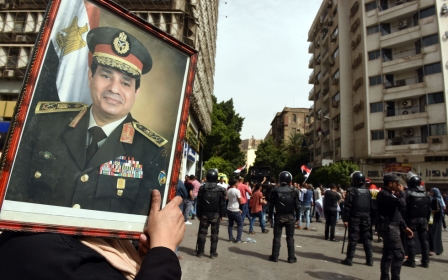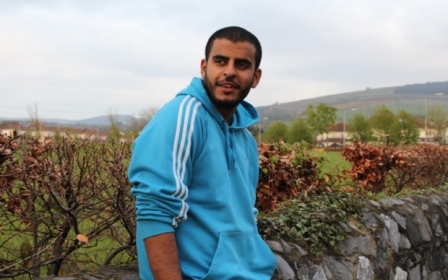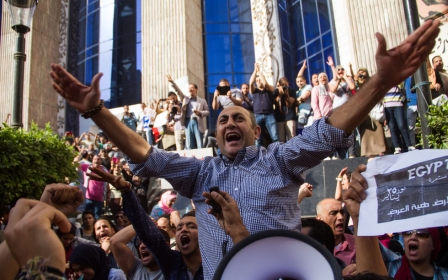Egypt's courts jail 152 in day over Red Sea islands protests

A court in Egypt on Saturday handed down five-year prison sentences to 101 people charged with taking part in illegal protests.
The specialised anti-terror court, held at a security base in northern Giza, also fined 79 of the defendants 100,000 Egyptian pounds ($11,260) for taking part in a wave of protests on 25 April that has been dubbed “Land Day”.
The defendants were found guilty on a range of charges including “incitement to protest without a permit,” a breach of Egypt’s strict law that forbids any demonstrations that take place without prior permission from the police.
The judgement brought to 152 the number of people imprisoned on a single day over the Land Day protests, after a court in Cairo on Saturday morning sentenced a group of 51 people to two years in prison.
The 25 April protests marked the second day of demonstrations against the government’s decision this year to hand over two Red Sea islands, which many consider integral Egyptian territory, to Saudi Arabia.
Police quickly dispersed protests against the islands deal on 25 April and arrested dozens of people. Prosecutors charged them with participation in illegal rallies.
The deal to hand over the islands in the Straits of Tiran galvanised dissidents who oppose President Abdel Fattah al-Sisi.
In the lead-up to the protests, police made dozens of arrests to discourage a repeat of a large rally on 15 April at which demonstrators chanted for the "fall of the regime".
The government says the islands had always belonged to Saudi Arabia and that Egypt had merely administered them while on lease since the 1950s.
Critics accuse Sisi of "selling" the islands in return for Saudi investments.
Sisi, a former army chief who was elected president after overthrowing his Muslim Brotherhood predecessor, Mohamed Morsi, in 2013, has been accused by activists of installing a heavy-handed government that tolerates no dissent.
After Morsi's overthrow, a police crackdown killed hundreds of protesters, while hundreds of policemen and soldiers have died in a militant insurgency that has mostly been confined to the restive Sinai Peninsula but has also seen attacks in the capital.
The government’s crackdown has extended to secular and liberal dissidents over the past two years.
Sisi had initially been feted by millions of Egyptians who opposed Morsi's rule and welcomed a firm leader at the helm to revive the economy.
But he faces growing discontent, with the islands controversy seen as another example. The government announced the deal a day after it was signed during a visit by Saudi King Salman.
New MEE newsletter: Jerusalem Dispatch
Sign up to get the latest insights and analysis on Israel-Palestine, alongside Turkey Unpacked and other MEE newsletters
Middle East Eye delivers independent and unrivalled coverage and analysis of the Middle East, North Africa and beyond. To learn more about republishing this content and the associated fees, please fill out this form. More about MEE can be found here.




